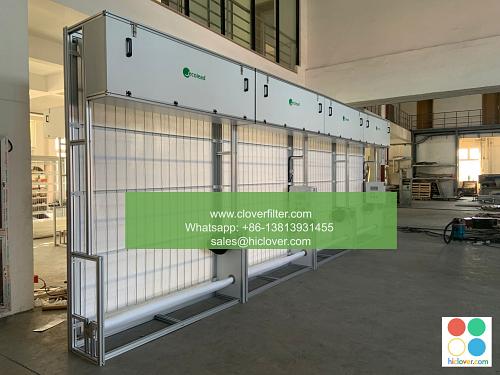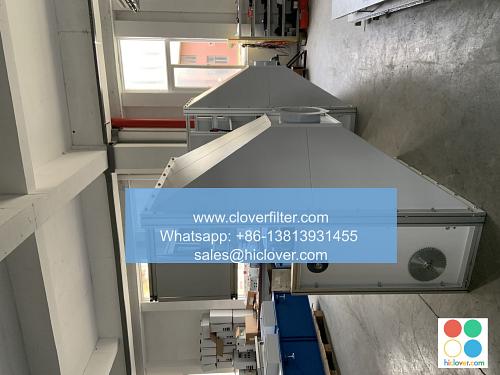The Benefits of Automatic Roll Air Filters in St. John’s Hospital

St. John’s Hospital, like many other healthcare facilities, is committed to providing a clean and healthy environment for its patients, staff, and visitors. One of the key components in achieving this goal is the use of air filtration systems. Recently, the hospital has installed automatic roll air filters, which have proven to be a highly effective and efficient solution for improving indoor air quality. In this article, we will explore the benefits of automatic roll air filters in St. John’s Hospital and how they contribute to a healthier environment.
Automatic roll air filters are designed to capture airborne particles, including dust, pollen, and other contaminants, which can exacerbate respiratory problems and compromise the health of patients and staff. These filters are made of a continuous roll of filter media, which is automatically advanced as it becomes dirty, ensuring that the air passing through the filter remains clean and free of contaminants. This automated process eliminates the need for manual replacement of filters, reducing maintenance costs and minimizing downtime.
One of the primary benefits of automatic roll air filters is their ability to improve indoor air quality. By capturing 99.97% of particles as small as 0.3 microns, these filters provide a high level of protection against airborne pathogens, including bacteria, viruses, and fungi. This is particularly important in healthcare settings, where patients with compromised immune systems are more susceptible to infection. The use of automatic roll air filters in St. John’s Hospital has resulted in a significant reduction in the transmission of airborne diseases, creating a safer environment for patients and staff.
In addition to improving indoor air quality, automatic roll air filters also offer significant energy savings. By reducing the amount of energy required to heat and cool the air, these filters can help lower the hospital’s energy consumption and reduce its carbon footprint. This is achieved through the use of advanced filter media, which is designed to minimize airflow resistance, reducing the energy required to push air through the filter. As a result, St. John’s Hospital has seen a noticeable reduction in its energy costs, which can be allocated to other important areas of the hospital.
The installation of automatic roll air filters in St. John’s Hospital has also had a positive impact on the hospital’s maintenance costs. With the automated replacement of filters, maintenance staff can focus on other critical tasks, reducing the need for frequent filter replacements and minimizing downtime. This has resulted in a significant reduction in maintenance costs, which can be allocated to other important areas of the hospital. Furthermore, the extended lifespan of the filter media reduces the amount of waste generated, making the hospital’s operations more sustainable.
Another benefit of automatic roll air filters is their ability to provide real-time monitoring and feedback. The filters are equipped with sensors that monitor airflow, pressure, and filter condition, providing maintenance staff with real-time data on the filter’s performance. This allows for prompt identification of any issues, enabling maintenance staff to take corrective action before they become major problems. This real-time monitoring and feedback capability have improved the overall efficiency of the hospital’s air filtration system, ensuring that the air remains clean and healthy at all times.
In conclusion, the installation of automatic roll air filters in St. John’s Hospital has proven to be a highly effective and efficient solution for improving indoor air quality. The benefits of these filters, including improved indoor air quality, energy savings, reduced maintenance costs, and real-time monitoring and feedback, have all contributed to a healthier environment for patients, staff, and visitors. As the hospital continues to prioritize the health and well-being of its community, the use of automatic roll air filters will remain an essential component of its air filtration system.
Frequently Asked Questions
Q: How often do automatic roll air filters need to be replaced?
A: Automatic roll air filters are designed to be replaced automatically as the filter media becomes dirty. The frequency of replacement depends on various factors, including airflow, particle loading, and filter media type.
Q: Can automatic roll air filters capture airborne pathogens?
A: Yes, automatic roll air filters can capture airborne pathogens, including bacteria, viruses, and fungi, providing a high level of protection against airborne diseases.
Q: Do automatic roll air filters require maintenance?
A: While automatic roll air filters are designed to be low-maintenance, they still require regular monitoring and maintenance to ensure optimal performance. Maintenance staff should check the filters regularly to ensure they are functioning correctly and replace the filter media as needed.
Q: Can automatic roll air filters be used in other industries?
A: Yes, automatic roll air filters can be used in various industries, including commercial, industrial, and residential settings, where improving indoor air quality and reducing energy consumption are a priority.


